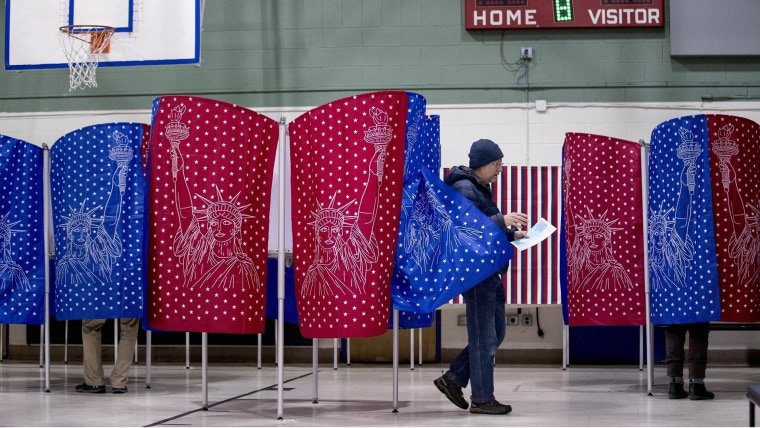MANCHESTER, N.H. — Bernie Sanders has won the New Hampshire Democratic primary, according to an NBC News projection.
Sanders, who represents neighboring Vermont, had been leading in the polls so his victory isn't a surprise. Pete Buttigieg and Amy Klobuchar were vying for second place. If it holds, Klobuchar's result would be a strong performance.
At the same time, former Vice President Joe Biden and Sen. Elizabeth Warren, D-Mass., were headed toward poor showings and won't get any delegates, NBC News projected.
With 53 percent of precincts reported, Sanders had 27.1 percent, or 41,711 votes, Buttigieg was at 23.6 percent, or 36,293 votes, Klobuchar had 19.7 percent, or 30,355 votes, Warren at 9.4 percent, or 14,430 votes and Biden was at 8.5 percent, or 13,089 votes, according to the NBC News tally.
Candidates must meet a threshold of 15 percent in the state's two congressional districts or statewide to win delegates. Aware of a poor showing, Biden has already left New Hampshire for South Carolina, the site of the next primary.
Sanders, Klobuchar and Buttigieg had all reached the threshold to win delegates at the congressional district and statewide level, according to NBC News. With 24 delegates at stake, Sanders had 7, while Buttigieg and Klobuchar each had 6.
Buttigieg wins electability score in NH primary voters exit poll
Feb. 12, 202002:28NBC News exit polls showed that 48 percent of the state's Democratic primary voters made up their mind within the past few days — a substantial increase from 25 percent saying they did in 2016 and 38 percent in 2008. The same amount of Democratic voters, 48 percent, said Friday's debate, in which Klobuchar's performance was widely praised, was either the most important or an important factor in their choice.
Addressing supporters in Manchester, Warren said Democrats "might be headed for another one of those long primary fights that lasts for months."
"We're two states in, with 55 states and territories to go," she said, according to her prepared remarks. "We still have 98% of the delegates for our nomination up for grabs, and Americans in every part of our country are going to make their voices heard."
On the Republican side, President Donald Trump won the GOP primary, NBC News projected.
Meanwhile, upstart Democratic presidential candidate Andrew Yang dropped out of the race Tuesday evening, sources close to the campaign said. Yang rose from obscurity to become a second-tier player in the primary and outpaced a number of prominent current and former elected officials.
"We have touched and improved millions of lives and moved this country we love so much in the right direction," Yang told supporters in Manchester. "And while there is great work left to be done, you know I am the math guy, and it is clear tonight from the numbers that we are not going to win this race. I am not someone who wants to accept donations and support in a race that we will not win. And so tonight I am announcing I am suspending my campaign for president."
Additionally, Sen. Michael Bennet, D-Colo., announced he, too, is dropping out of the race following a poor showing in New Hampshire.
"I wish all those candidates well that are going beyond New Hampshire," Bennet told supporters. "I think it's fitting for us to end the campaign tonight, but I want to remind you of why I got in this race, why I stayed in this race and why we have to stay in this fight."
Entering primary day, Sanders was comfortably leading in the polls, trailed by Buttigieg. Behind them was a three-way battle for third place between a surging Klobuchar, Elizabeth Warren and Joe Biden.
The vote came as last week's Iowa caucus results were being contested. Both Sanders and Buttigieg have claimed victory there.
Democratic candidates spent the day of New Hampshire's first-in-the-nation primary talking up their candidacies and taking aim at a rival who isn't even on the ballot here — former New York City Mayor Michael Bloomberg.
The early story of the day was Biden's decision to leave New Hampshire hours before the polls closed and head straight to South Carolina, where he enjoys an advantage with black voters in the state, though that edge over his rivals has been quickly narrowing.
"Look, the rest of the nation is out there," Biden said at a Manchester Dunkin' store on Tuesday. "There's an awful lot of electoral votes to be had, and we're going to see and I think we are going to do well in Nevada and in South Carolina, and we'll go from there. We'll see."
On MSNBC's "Morning Joe" earlier, Biden said he sees himself as an "underdog" in New Hampshire after finishing a disappointing fourth in Iowa.
"I think I’m an underdog here, and Bernie won this by 20 points last time," Biden said, referring to the 2016 primary. "He’s got a next-door neighbor advantage and he’s got a real enthusiasm going here, but I still feel good. This is, you know, it’s a long haul."
New Hampshire will not repeat the chaos of Iowa, primary officials say
Feb. 11, 202001:58Elsewhere, Warren, from neighboring Massachusetts, told NBC News' Ali Vitali that Biden's decision to leave the state "says that he's not here to fight for the votes in New Hampshire."
"Look, I think that this is what democracy is about. We get out here, we talk to voters and we fight for every vote," she said. "That's who I am. I am a fighter."
Both Warren and Buttigieg contrasted themselves with the front-running Sanders.
Speaking earlier with NBC's "Today," Buttigieg said he thinks it "would be very difficult" for Sanders to win in the fall "because of the his approach."
Sanders told NBC News on Tuesday his campaign speaks "to disenchanted working people who have kind of given up on the political process," adding, "we are the campaign to bring out that voter turnout and the campaign to defeat Trump."
But much of the other swiping on Tuesday focused on Bloomberg, who is bypassing the early states to focus on the March 3 Super Tuesday contests. The billionaire surged in national polls as the New Hampshire vote neared and has poured more than $100 million into advertising so far, building up a large ground game in more than 30 states, too.
"This is what I think, you know, Mike Bloomberg and anybody else has every right in the world to run for president of the United States," Sanders said in an interview with NBC News anchor Lester Holt. "But I got a real problem with multibillionaires literally buying elections."
Speaking with MSNBC, Klobuchar, of Minnesota, said she believes "people do not look at Donald Trump and say, can we get someone richer?"
"I think they want someone different and someone who is going to be able, as I said at the debate, put themselves in their shoes, and that's what I've got in spades," she continued. "I'm telling people that we are all in to the end, that I've got the grit to do this, but I also have the heart to do this and we are pretty excited about it."



